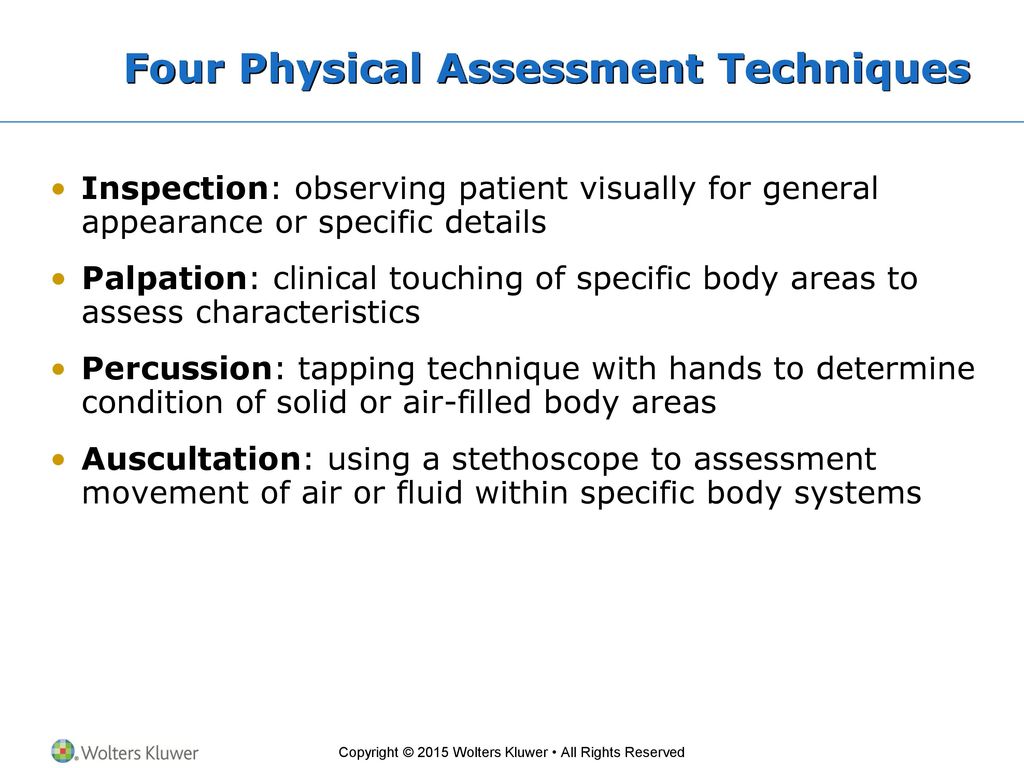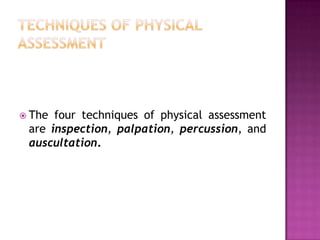Assessment of the patient through touch to assess texture temperature moisture size shape location position vibration crepitus tenderness pain and edema. Inspection palpation percussion and auscultation.

Nclex Rn Practice Question 792 Medical Estudy
Palpation and percussion can alter bowel sounds so youd inspect auscultate percuss then palpate an abdomen.

. Physical assessment findings or objective data are obtained through the use of four specific diagnostic techniques. A systematic data collection method that uses the senses of sight hearing smell and touch to detect health problemsThere are four techniques used in physical assessment and these are. Observing patients for physical characteristics and behaviors and smelling for odors.
Inspection palpation percussion and auscultation. What are the four phases of Physical Assessment. Head-to-Toe Physical Assessment Establishing a good physical assessment would later-on provide a more accurate diagnosis planning and.
About Press Copyright Contact us Creators Advertise Developers Terms Privacy Policy Safety How YouTube works Test new features Press Copyright Contact us Creators. In general the physical examination is divided into 4 parts. Heres a quick video on the 4 assessment techniques.
There are four methods that are typically used to complete the physical assessment portion of a health assessment. Use them in sequenceunless youre performing an abdominal assessment. Identifying the purpose of the assessment.
Taking a health history. Palpate four quadrants for pain and bladderbowel distension light palpation only. Inspection Palpation Percussion Auscultation Dont forget to like subscribe.
WHEN YOU PERFORM a physical assessment youll use four techniques. Heard in overinflated lungs as in Emphysemia. An exception is in the assessment of the.
However in abdominal assessment the order is inspection auscultation percussion and then palpation. The single most useful device for optimal performance of the physical examination is an inquisitive and sensitive mind. They are inspection palpation percussion and.
Cranial nerve assessment motor function assessment sensory function assessment and assessment of reflexes. Inspection palpation percussion and auscultation. Inspection - it is the visual examination that is assessing by using the sense of sight.
Inspect each body system using vision smell and hearing to assess normal conditions and deviations. And examining the patient using the sequence of. Direct methods of studying unstained specimens include dissecting it and physical assessment.
Push and make a. J Recall questionnaires tend to be used more often than other types of self-report assessment and examples for youth include the Previous Day Physical Activity Recall 1d-PAR the 3-day Physical Activity Recall 3d-PAR and the Youth. Assessing patients effectively 1.
Four major categories of self-report assessments are records or logs h recall questionnaire quantitative history i and global self-report. There are four techniques used in physical assessment and these are- Inspection palpation percussion and auscultation. It should be deliberate purposeful and systematic.
Less important are the tools required for the examination Table 41. Palpation requires you to touch the patient with different parts of your hands using. Normal lung tissue sounds.
Inspection percussion and auscultation. Four primary techniques are used in the physical examination. There are four techniques used in physical assessment and these are- Inspection palpation percussion and auscultation.
There are 12 cranial nerves and these arise from the brain. Approach using the techniques of inspection palpation percussion and auscultation. A nurse is assessing four adult clients.
Loud high pitched abdomen 2. Usually these assessment techniques are performed in this order when body systems are assessed. Inspection Auscultation Palpation and Percussion.
Usually history taking is completed before physical examination. Techniques used in physical assessment In general assessment there are four ways to perform the physical assessment namely. Choosing a comprehensive or focused approach.
Inspection palpation percussion and auscultation. Palpation requires you to touch the patient with. Next most useful is mastery of the techniques of observation palpation percussion and auscultation.
The framework presented here consists of the following sequence of steps. The nurse inspects with the naked eye and with a lighted instrument such as an otoscope. In general the physical examination is divided into 4 parts.

Chapter 3 Physical Examination Techniques And Equipment Ppt Download
Objective Assessment Physical Examination Techniques A Nurse S Guide

Approach To The Physical Assessment

Faculty Of Nursing Iug Chapter 4 Physical Assessment Techniques Ppt Download

Faculty Of Nursing Iug Chapter 4 Physical Assessment Techniques Ppt Download

Chapter Three Approach To The Physical Assessment Ppt Download

Physical Assessment Examination Head To Toe Ppt Video Online Download

By Dr Hala Yehia Methods Of Examination Objectives 1 List 4 Techniques For Physical Assessment 2 Define Inspection 3 Determine Characteristics Of Ppt Download
0 comments
Post a Comment